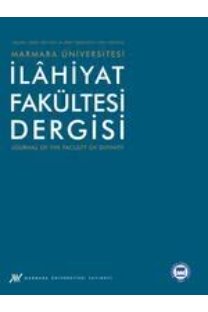The Place of The Sacred with Regard to Gadamer's Ontology, of Art
AbstractThe experience of art-work is, for Gadamer, related to ınıılı which goes beyand the metlıodologicalknowledge. Hence discovering of truth is possible through the antology of art, and the experienceof art is an experience of truth that can be applied to the hermeneutic problem in its wholedimension. The work of art is, in this respect, the experience of truth as an 'event'. Opposing tothe aesthetic differentiat'i on which abstracts the work of art from its possibilities of content (religious,moral, culrural), Gadamer tries to overcome this distinction of consciousness through theconcept of game. The reason of Dasein's inner rensian towards the "unknown" is the fact of remainingof the sacred/infinite as non-understanding. Gadamer argues that the work of art transformsthe tension into the relaxation by means of the ontological hermeneutics of it. Therefore,the distinction between sacred and profane is relative in Gadamer; and all the works of art havealways sacred about it and the sacred speeches ro us via the work of art. In this article, it will beseen how Gadamer establishes this togethemess with regard to the antology of art.Key W ords: sacred, the work of art, experience, truth, hermeneutic, game, rransfom1ation in tostructure, contemporaneity,ÖzetGadamer'e göre sanat eserinin tecrübesi metodolajik bilgiyi a§an lıakikate ili§kindir. Bu bakımdanhakikatin ke§fi sanat eserinin ontolojisi üzerinden mümkündür ve sanat eserinin tecrübesi, tümboyutİanyla hermenötik probleme uygulanabilecek bir hakikat tecrübesidir. Sanat eseri, buyönüyle, hakikatin bir "olay" olarak tecrübe edilmesidir. Sanat eserini, onun içerik §artlanndan(dini, ahlaki, kültürel) soyurlayan estetik farklılaşmaya kar§ı olan Gadamer, bu bilinç ayrunuu oyıınkavramı üzerinden a§mayı dener. Dasein'ın "bilinmeyen"e yönelik içsel gerilinlinin nedeni de,kutsahn/sonsuzun anla§ılamayan olarak kalmasıdır. Gadamer sanat eserinin ontolojik hermeneutiğiaracılığıyla bu gerilimin "rahatlama"ya neden olduğunu savunur. Dolay1Siyla kutsal ile profanarasındaki ayrım Gadamer'de nisbidir ve her sanat eseri daima kendisine has kutsal bir §eyipayla§tr ve kutsal bize sanat eseri üzerinden hitap eder. Bu makalede Gadamer'in bu birlikteliğisanat ontolojisi açısından nasıl tesis ettiği görülecektir.Anahtar Kelimeler: kutsal, sanat eseri, tecrübe, hakikat, hermenötik, oyun, yapıya dönü§üm, e§zamanhhk.
Anahtar Kelimeler:
kutsal, sanat eseri, tecrübe, hakikat, hermenötik, oyun, yapıya dönüşüm, eşzamanlılık
___
- Gadamer, Hans Georg, Truth and Method, trans. Joel Weinsheimer and Donald G. Marshall, Continuum Publishing Group, London, 1989.
- ---=·' "Aesthetics and Hermeneutics", The Gadamer Reader: A Bouquet of Later Writtings, trans. David Linge, edited by Richard Palmer, Northwestern University Press, 2007, pp. 123-13 2.
- ___ ,"The Artwork in Word and Image: 'So True, So full ofBeing"', The Gadamer Reader: A Bouquet of Later Writtings, trans. Richard E. Palmer, ~orthwestem University Press, 2007, pp. 192-224.
- ___ ,,"The Universality of the Hermeneutic Problem", Plıilosoplıical Hermeneutics, trans. and edited by David E. Linge, University ofCalifomia Press, 1977, pp. 3-18.
- ___ , '"On the Problem of Self-Understanding", Philosoplıical Hermeneutics, translated and edited by David E. Linge, University ofCalifomia Press, 1977., pp. 44-59.
- ___ , "Hermeneutics as Practical Philosophy", The Gadamer Reader: A Bou.quet of Later Writtings, trans. Frederick G. Lawrence, Northwestem University Press, 2007, pp. 227-246.
- Bemet, Rudolf, "Gadamer On the Subject's Participation in the Game ofTruth", The Review ofMetaplıysics, vol. 58, no: 4, Qun. 2005), pp. 785-814.
- Georgia, Wamke, Gadamer: Hermeneutics, Tradition and Reason, Standford University: Standford, 1987.
- Lawrence, Fred, "Gadamer, the Hermeneutic Revolution, and Theology", Cambridge Companian to Gadamer, edited by Robert J. Dostal, Cambridge University Press, Cambridge, 2002, pp. 167-201.
- Tokat, Latif, "Sanat Kursalın if§ası mıdır?", M. Ü. İlalıiyat Fakültesi Dergisi, 29, 2005(2), pp. 137-163.
- West, David, Introduction to Continental Plıilosoplıy, Blackwell Publishing, Oxford, 1996.
- ISSN: 1302-4973
- Başlangıç: 1963
- Yayıncı: Marmara Üniversitesi
Sayıdaki Diğer Makaleler
Kelam Kozmolojisinin (Dakiku'l-Kelam) Bilimsel D~ğeri
Muhammed ET-TAİ, Mehmet BULĞEN
Türk Taksim Formunda Duraklama'nın -Sözel Bir Anlatım OlarakKullanımı, Fonksiy~rhu ve Anlamı
Yoram ARNON, Ahmet TURABİ, Hikmet TOKER
The Place of The Sacred with Regard to Gadamer's Ontology, of Art
Dini Yönelim Boyutlarının Kişiliğin Beş Boyutu ile İlişkisi (Amprik Bir Araştırma)
Abdullah ER-RUVEYTE, Abdullah Salih ER-RUVEYTE, Ali AYTEN
Kelam İlıninin Kozmolojik Boyutları . ye Günümüz Kozmolojisi
Kur'an'ın Sıhhati Bağlamında Kıraat Farklılıkların Değerlendirilmesi
